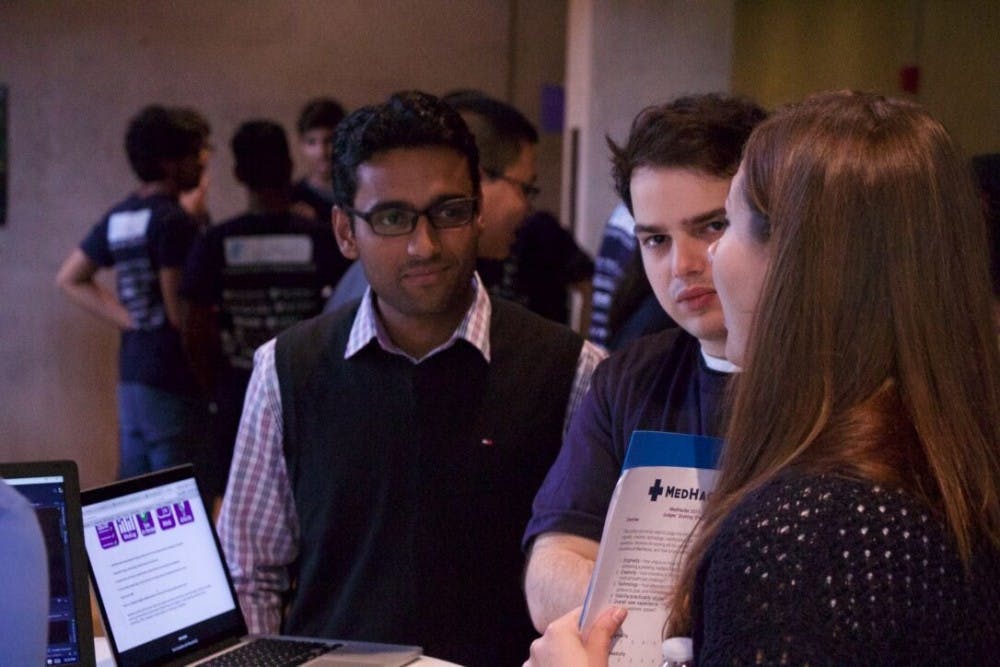By ELIZABETH LIU Senior Staff Writer
This past weekend, more than 300 undergraduate and graduate students from around the world gathered in the Bloomberg Center for Physics and Astronomy to participate in the University’s first-ever student-run medical hackathon, MedHacks.
A hackathon is a multi-day event in which people, usually software engineers and programmers, come together to learn about and come up with creative solutions to different problems. MedHacks was conceived by several Hopkins undergraduates, including juniors Ron Boger and Kush Gupta, who were inspired by the MIT medical hackathon.
Unlike traditional hackathons, such as the semiannual HopHacks, MedHacks focuses exclusively on healthcare issues to give interested students opportunities to meet experts and companies at the forefront of medical technology. It brings together students who have similar goals of improving healthcare.
“This basically started up when Ron had first heard about MIT’s medical hackathon, which is one of the very few well-established medical hackathons out there,” Gupta said.
“When Ron came across MIT’s model, we realized Hopkins should also have a medical hackathon too, because we have engineers as well as access to some of the best medical researchers in the world over at the Hospital. We also felt that the community here
could really benefit from the explosion of creativity and innovation that comes along with hackathons.”
Tiffany Wong, a senior from Virginia Commonwealth University (VCU), was excited to be a participant in Medhacks.
“I’m really happy to be here and work with other motivated students to come up with different solutions to different healthcare issues,” she said.
Sponsors, such as ManaHealth and A-Level Capital, were also eager to be involved with MedHacks.
“When you think about the really big problems in the world or even our nation right now, healthcare and reinventing healthcare is one of the biggest ones,” Elizabeth Galbut, a founder of A-Level Capital, said. “Our healthcare costs in the U.S. are out of control, and there are so many opportunities for medicine and technology to both improve patient outcomes and reduce cost... We believe that technological talent helps drive innovation, and we want to find the best talent at Hopkins so we can fund them.”
“Johns Hopkins has a fantastic brand, and a lot of intelligent people are here,” Chris Bradley, the CEO and co-founder of ManaHealth, said. “We really want to support students who have a passion and who have a fantastic university supporting them. A lot of innovation happens here so, logically, we want to come in and help where we can.
“We’re giving all participants access to our ManaCloud Application Programming Interface (API). It’s just one place participants can connect their apps to get access to data from hospitals without having to integrate to every hospital the participants want to go live on. And hopefully we’ll be able to help support a lot of the interesting innovative applications that are going to be hacked away here.”
During the first round of preliminary judging, five judges evaluated each project for its technicality, practicality, potential impact, aesthetics, originality and “WOW factor.” Ten projects were chosen from the original 28 and presented on Sunday afternoon.
The projects tackled a multitude of issues, including optimization of medical equipment donations, providing emergency healthcare for individuals who are not within range of emergency medical services, and difficulties with patient identification. These finalists were reviewed by the same panel of judges, and the teams that presented them were grilled about the funding for, focus of and reliability of their ideas and products.
The judges awarded the grand prize of $750 to Deep Vein Thrombosis Detection for creating a device that could emit ultrasound to recognize the presence of blood clots. The team was made up of a very diverse group of individuals, comprising several students from universities across the country.
“My group was pretty diverse, and we had a lot of younger people,” senior Amber Velasco, a member of the winning team, said. “Even so, we had really good team dynamics and split up the group based on skill sets.”
The second-place prize of $500 was awarded to Project 1, consisting of Alissa Zingman, a medical resident, and Ethan Nyberg, a Ph.D. candidate, for coming up with a new way to diagnose compartment syndrome.
The third place prize of $250 was awarded to MedMatch Help for creating a text messaging-based service that allows healthcare professionals in the developing world to send requests for medical equipment. The team consisted of VCU seniors Brittany Allen and Sindora Baddam, VCU junior Jacob Jaminet and Hopkins doctor Lijo Panghat.
“Our inspiration came from a program Sindora and I participated in over the summer,” Allen said. “We spent two months with Engineering World Health Summer Institute Program helping engineers and doctors repair medical equipment in developing countries.”
Not all groups had smooth sailing. Lucy Han, a Hopkins senior, admitted that her team had a lot of difficulties getting their ideas up and running.
“We hit a lot of roadblocks,” Han said. “We almost gave up in the middle. Most of my group went home... but we were able to figure out our issues, pull through and get our program running by the end.”
All winners were offered memberships to the Social Innovation Lab, and all participants were offered an extended deadline for mentorship and support from the Social Innovation Lab.
Gupta has high hopes for the future of MedHacks.
“It took a lot of time to get this together, but at the same time everybody really enjoyed it... At minimum it will happen again next fall.”





